Interview: Isobel Waller-Bridge Talks BLOOD WEDDING and FLEABAG
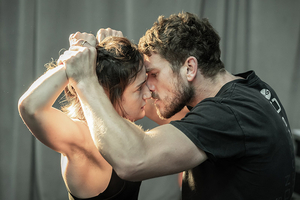
in rehearsal for Blood Wedding
Isobel Waller-Bridge is a veteran of musical storytelling. She's composed for the crème de la crème of TV, film, and theatre. Her score for the hit series Fleabag is fast becoming iconic.
Her screen soundtracks include Vanity Fair, Vita & Virginia and Black Mirror, and her recent work for theatre include Woyzeck at the Old Vic, and Knives in Hens at Donmar Warehouse.
BroadwayWorld speaks to Waller-Bridge ahead of tonight's opening of a new adaptation of Federico García Lorca's tragedy, Blood Wedding, penned by Marina Carr and directed by Yaël Farber.
How did you get into composition?
I studied music at university and was writing lots of atonal, orchestral music, studying with [British composer] George Benjamin at King's College London, and then I went to the Royal Academy of Music. I started assisting a film composer and he advised me to do some theatre. Because, he said, theatre will "make you good".
I always knew I wanted to do storytelling through music, collaborating with other people, and with other creative elements. I assisted composers at the National Theatre and did a lot of scratch nights. My friends and I had a bit of a theatre collective in our twenties, putting plays on in pubs, and when they received bigger commissions, I joined them!
Tell us about Blood Wedding. How's it going?
It's going well! It's a complicated play and it's very technical. Like so many plays, it lives in the rehearsal room, but then you need to make it into actual theatre: all the elements need to come together. It's a delicate play so it needs a lot of refining. That's the joy of the process, though.
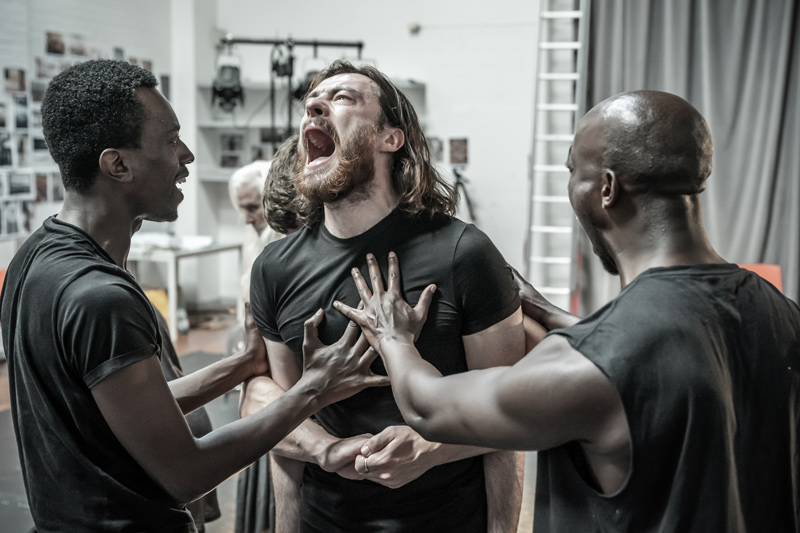
Roger Jean Nsengiyumva
in rehearsal for Blood Wedding
What's the play about?
It was originally written by [Federico García] Lorca, and Marina Carr has created a new adaptation. The original play was born just before the Spanish Civil War.
It's sort of tribal: a wedding has been arranged between The Groom and The Bride, but The Bride is in love with someone else from a different tribe. On her wedding night, she escapes with Leonardo, the other man, and they run off and the villagers follow them...
It's dark, and intense, and it is harrowing.
Yerma, also by Lorca, was adapted for the Young Vic [starring Billie Piper] a couple of years ago: is it similar thematically?
It's a story of love and conflict, and outside people coming in and taking. The bigger picture in staging this - and the question Yaël is asking - is "Why now?". There's a lot of violence in the world. The play does have the same intensity as Yerma, but it deals with a different sacrifice.
All of these things, violence and conflict, are in us. It's very dark, but there are moments of liberation.
What sort of music have you chosen for the play?
Musically, I would like people to understand that, although the play is within an Irish context (Marina and many of the actors are Irish), it is reflecting on the world. You can hear some mythic elements that help to open our imaginations to think of other places, too.
There's a character that is The Moon, in the production, who is sort of the poet, like Lorca. She sings in Spanish and in English. The singing is a big part of the score. The Moon narrates and oversees the drama, and so in her world, there's a very otherworldly aesthetic.
There's are some Armenian influences in there, too, and some ties back to Spain because of Lorca. There are strings, and cellos, to create a more Irish feel. I've also included a duduk.
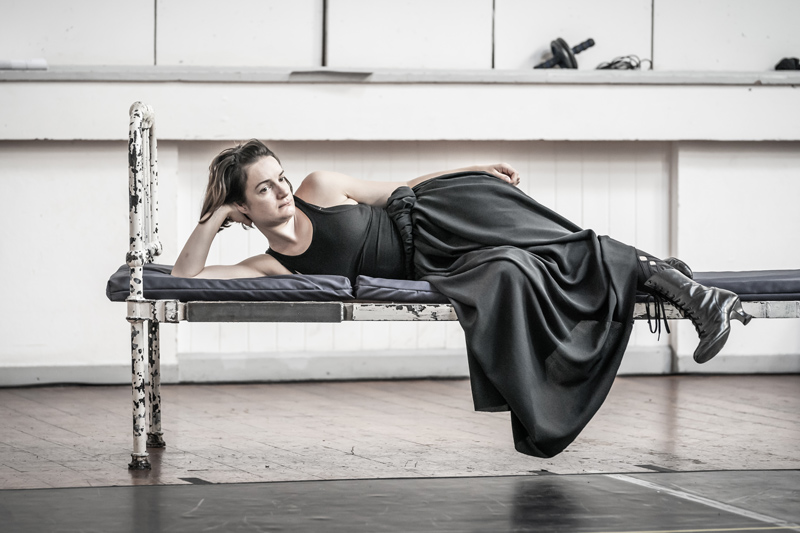
for Blood Wedding
A what?!
It's a Spanish instrument. It's amazing! When Yaël suggested it, my heart exploded. It's an ancient Spanish wind instrument: there are only a couple of people who play it in this country.
Is composing for theatre quite reactive? At what stage might a composer become involved in a show?
Yaël and I started talking about ideas months before rehearsals: we would talk about how the music would tie in. I read Marina's script and got the rhythm of that. But I didn't start writing, really, until the rehearsal period.
Your receivers have to be up and you have to be so alive to what you're seeing: to react quickly to what is being created. During rehearsals, I will sketch ideas, and then when the project grows and other people bring in theirs, you must make sure you're all singing from the same hymn sheet.
The crucial time is the tech period - a piece of music I've written suddenly might not marry with the set design, for example. You must be so quick. I love that.
You've done a lot of work for TV and film, too - how is the process different?
You don't have rehearsal time, which is the main difference. They send you assemblies [footage] so you can see what they're up to and what the aesthetic is. But you're not with other people, like in theatre where it's more collaborative.
In TV, the music is the last thing to happen. When they start the edit, I'lll start to write to the picture until they 'lock it' and then I'll get much more precise.
In theatre, it's so exciting. Creatively, you become one head with the whole creative team. It's so intense and thrilling.
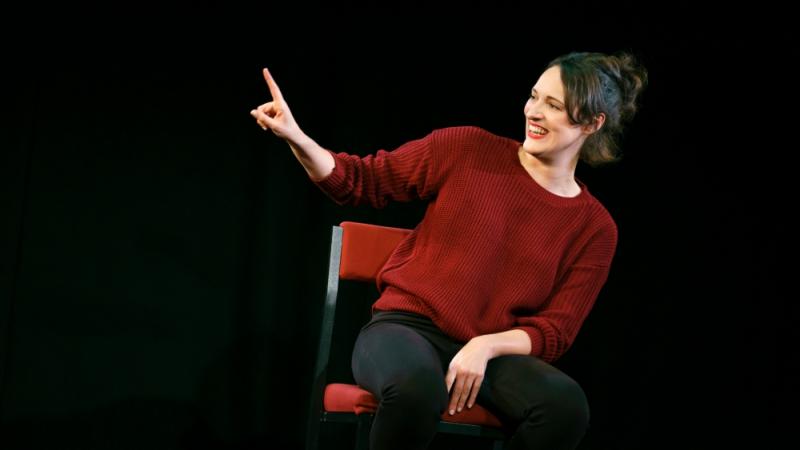
in Fleabag
Can we please talk about Fleabag - the music is so iconic already
Yes! It was so fun!
Every single time I think about Fleabag, my whole heart fills with joy. It was such an extraordinary process. Writing that score was wonderful, and I love working with my sister [writer and creator of Fleabag, Phoebe Waller-Bridge].
What was exciting is that when I was writing the choral music that features throughout, the production team were in the edit, and they hadn't locked anything in, so I was still writing thematically.
Then, I'd recorded the music with the choir, and I sent it over and it just hit every single part. We were all so connected in the process - so much so that the music just slotted in. Usually, there's so much refining, and changing, but we put on the scenes and it just fitted.
Have you worked with Phoebe before?
Only when we were kids. We did radio plays in our teens. Or, she would write poems and I would write music. We wrote songs together in our late teens; just sitting around the piano and she wrote lyrics while I played.
We worked together a little through Drywrite [the production company behind the stage play of Fleabag] as Vicky [Jones, its Artistic Director] and Phoebe were curating it. Fleabag, the play, was the first proper opportunity, followed by the series. We realised how wonderful it is, getting to work and hang out with your best friend.
Crucially, we share a similar sense of humour and see the world in a similar way. Music is so abstract. Phoebe will say something like "Can it sound like this?", and then she'll make a facial expression and I'll just know what to do... It's hard for directors to talk about music, sometimes, so you have to talk about it in an abstract way: in feelings, rather than directly about instrumentation.
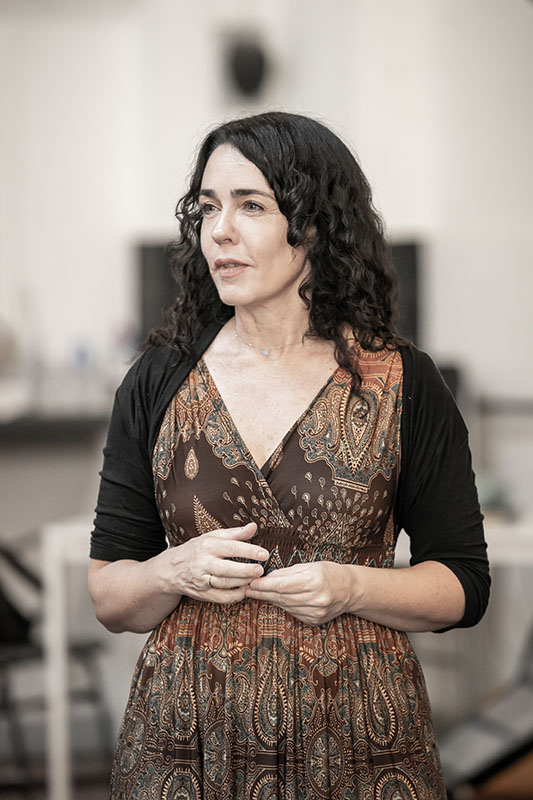
for Blood Wedding
It's got people excited about women's writing. At the Edinburgh Fringe this year there was a real sense of people looking more intently at one-woman shows.
It's wonderful that it did that. It was six years ago that the play went to the Fringe. When it was brought to the West End, it felt right that it was ending. It's been a wild journey with a huge response. There's a feeling that it now needs to end: to make room, for all of these other amazing writers. It's so exciting for the next generation.
We all, everyone involved, feel that Fleabag has... sat down. It's time for the next thing. It's brought the most amount of joy. The response has been utterly unreal. We had no idea that this would happen.Especially since the second series: people have really come with us on the journey of it.
How is it working with this team, on Blood Wedding?
This is the second time I've worked with Yaël and I think she is a genius. Creatively, she is so inspiring and she has such a powerful vision. I knew instantly, when the offer came though, that it was a no-brainer. Marina Carr, too, is someone I respect and admire so much.
Lorca has somehow become part of my fabric: growing up, I read his poetry, and I read Blood Wedding in my twenties. It's a story I really wanted to tell, with this team - with the imagination they have brought to it. It feels like a real privilege.
Why do you think people should come see it?
It's a special play. It is unquestionably human, and poetic, and speaks about life and love, conflict and violence. All of these things are in us.
Blood Wedding is at the Young Vic until 2 November
Photo credit: Marc Brenner (Blood Wedding) and Joan Marcus (Fleabag)

Videos
